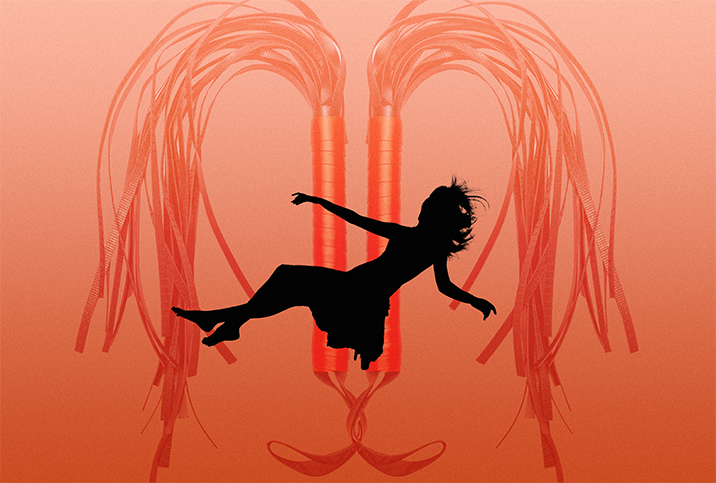Can Exploring in Bed Be a Potential Nightmare for Sexual Violence Survivors?

After I survived multiple incidents of sexual violence, a healthy sexuality felt unreachable, until I found a surprising—and complex—route to healing in the form of bondage, domination, submission and masochism (aka BDSM).
BDSM encompasses a broad range of practices and role-play, like playing with power dynamics, breath-play, spanking, bondage and so much more. Even though the BDSM community is built on a foundation of consent and safety, in my experimentation, I have experienced additional traumatic episodes that have complicated the process.
For survivors of sexual violence, BDSM can be a creative step toward reclaiming control, inside and outside of the bedroom. However, it would be naive to say it's universally healing for all sexual violence survivors.
Sexuality and sexual trauma
A series of sexually violent experiences, starting in childhood, inflicted deep wounds on my sexuality before it had developed. Incapable of setting boundaries, I used sex to fill deep cracks in my self-esteem.
The effects of sexual trauma on the psyche are wide-ranging. In the U.S., an American is sexually assaulted every 68 seconds, according to the Rape, Abuse, and Incest National Network, and each person's healing journey is unique to them.
"A sexual attack of any kind is obviously a huge violation," said Sarah Davies, D.Psych. practitioner doctorate, a counseling psychologist and trauma therapist based in the U.K. "It's a traumatic violation of personal boundaries—physical or psychological. When we experience a traumatic attack, our innate primitive survival instinct kicks in, its primary drive: to help us survive the ordeal."
Inducted into sexual activity too young, I developed hypersexual tendencies when I hit puberty. I used sex to hide from trauma, which contributed to additional assaults because I had no agency to remove myself from dangerous situations.
"A very common response is an overall lack of interest in sexual activity," explained Emerson Karsh, the BDSM expert for Honey Play Box, a California-based sex shop. "This happens for a plethora of reasons, such as trauma, fear, lower self-image, guilt and depression. On the contrary, another not-as-common response those who've experienced sexual violence can exhibit is hypersexuality."
AnnaLynne McCord, actress and activist, reveals how BDSM helped heal the wounds of her past sexual trauma. Watch the full interview here.
The potential of BDSM
I grew up without an understanding of consent, and assertiveness in sexual scenarios was a mystery. Sex felt mechanical and I frequently dissociated during penetration. Starting with playful experimentations with my first long-term partner, I found solace in the practices of BDSM, specifically in playing with power dynamics.
Advocating for BDSM as a sexual healing practice for all is ill-advised because everyone's journey is individual to them. But for some, there are potential healing benefits in BDSM.
"In BDSM activities, the practice is essentially based on being clear and being able to communicate our individual boundaries," Davies said. "A skillful dominant will know how to reach an edge while respecting your sexual, physical [and] psychological boundaries, therefore allowing you to experience some restoration of personal boundaries that were violated in a historic attack. This can bring about a completion of action that was not possible before, and actually be healing and therapeutic."
'A skillful dominant will know how to reach an edge while respecting your sexual, physical [and] psychological boundaries, therefore allowing you to experience some restoration of personal boundaries that were violated in a historic attack.'
In all my experiences of sexual trauma, I felt powerless and became passive to survive, later reflecting this behavior in consensual sex. Discovering a submissive mindset, I felt free simultaneously surrendering and asserting control with someone I trusted. Vulnerability balanced with clear boundaries meant I could get lost in the fantasy without having to worry about the past interfering. I also thrived in dominant scenarios, taking control of sexual situations I was once powerless in.
When I first started doing this, it was just really scary—you can feel the fear coming up and all your wounding or triggers coming out. I would cry and I would feel exhausted. Then there would be other times when I'd be like, wow, I feel so connected. I feel so alive and I have so much energy. I just feel like I'm glowing and radiant.
Power of words
Before BDSM, I struggled to vocalize sexual boundaries or interests and went along with my partner's desires because it felt safer than denying them. Experimenting in the bedroom, which is founded on the tenets of consent, safety and respect, I learned a significant lesson: If you can't talk about sex, you should not be having sex.
Before, during and after a BDSM scenario, it's crucial to discuss boundaries, needs and emotional response to the scene. The basics of communicating consent and desire can be a rejuvenating experience for survivors because it's a reminder that we are in complete control of everything that happens to our body.
"The beauty of BDSM is that a person can plan and create their ideal setting," Karsh said. "Everything can and is negotiated upon, and that can be really empowering for a sexual violence survivor. Before engaging in BDSM, consent and communication is thoroughly discussed, usually in a nonsexual setting before activity even starts."
Risks to consider
For a brief period, the euphoria of submission dominated my sex life and I used BDSM to escape, not to heal. Because of a nonexistent education in healthy sexuality, I thought BDSM was my only path to sexual healing, so I manipulated it into a twisted form of counseling by using the bliss of carnal desire to soothe my emotional wounds. "There are a lot of amazing ways BDSM can be therapeutic and trauma-informed for survivors," Karsh said, "but it is not a practice that will garner the same results as therapy. BDSM can be so beneficial in re-creating escapism, but it is not the equivalent of escaping."
Lost in the magic of experimentation, I retraumatized myself by playing with activities reminiscent of real, sexually violent experiences. In a BDSM scenario, where the likelihood of a triggering event can be higher, risk management is crucial. Establishing personalized rules is essential, especially because when you're in a sexual headspace, it's harder to think clearly and logically.
"We have these peak experiences, so when we go into BDSM, we experience complete physiological changes," said Caroline D'Arcy, a sexologist and women's coach based in the U.K. "It might be something like subspace, topspace, rope space, which means our bodies are flooded with endorphins and we have such different biochemical responses that we feel high as a kite."
To explore or not explore?
Prescriptions for sexual healing have to be written by each individual, whether BDSM plays a role is a decision only you can make through education and experimentation. Starting out, it is best to explore with partners you know and trust to safely test out your likes and dislikes.
"I think disadvantages happen more often, particularly if you've got past trauma, if it's someone who you've never met before properly or had a long conversation and connected with," said Ness Cooper, a U.K.-based sexologist. "I'd recommend going with someone you've built up a connection with. It doesn't have to be romantic—it could be a friendship."
Additionally, the importance of aftercare—a moment where partners physically and emotionally care for one another after a BDSM scene—cannot be overstated. It's a key practice in BDSM because scenarios can trigger an emotional drop, a natural effect that can follow an emotional high, like an intense kink scene or an intense intimate moment. Taking the time to soothe one another after a scene with physical touch or words of affirmation eases this process.
My experiments have varied largely. Some have been a triggering minefield where I learned key lessons about what not to do in BDSM and many have been a sexually freeing success that reaffirmed my boundaries and stripped shame from my sexuality. While BDSM may not be for everyone, it can encourage people to hone in on certain aspects and interests, and carve out their own idea of how they want to enjoy sex.

















